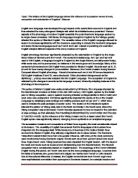Q. Write a note on the Latin influence on the English language.
A. The Latin influence affects the English language and vocabulary through three phases. The first phase was before the introduction of Christianity in England, the second phase was after the introduction of Christianity and the third phase was during and after the Renaissance.
Before the introduction of Christianity, some of the important Latin words which the English with their Germanic brethren on the continent borrowed were ‘wine’, ‘pea’, ‘plum’, ‘cheese’, ‘cheap’, ‘mint’, ‘street’ etc. The words that were borrowed mainly related to commerce and travel, war and warfare, names of household articles and names of plants and fruits. Some of the names mentioned above were brought with the Anglo-Saxons when they invaded England. In addition, the coming of Christian culture to England in a Latin form with the Roman missionaries and those from Ireland in the seventh century brought a few more Latin words of religious character, some of which have remained permanently part of the English language. Foreign ideas, such as those of monastic living, bishops and priests and Christian symbolism had no native equivalents except words already having heathen associations. Besides, these Christian Latin loan words in early OE times, there came into the language some permanent Christian words to express the new ideas also from purely native sources where new meaning were given to existing heathen native words to express new Christian connotations. For instance, the OE ‘Eastorn’ referred , before the coming of Christianity, to a great pagan spring festival celebrating their Goddess of spring called ‘Austro’. It later became ‘Easter’.








